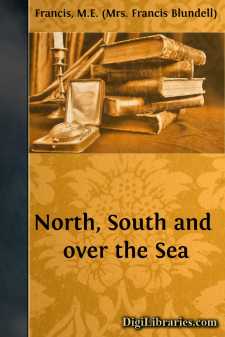Categories
- Antiques & Collectibles 13
- Architecture 36
- Art 48
- Bibles 22
- Biography & Autobiography 813
- Body, Mind & Spirit 142
- Business & Economics 28
- Children's Books 16
- Children's Fiction 13
- Computers 4
- Cooking 94
- Crafts & Hobbies 4
- Drama 346
- Education 46
- Family & Relationships 57
- Fiction 11829
- Games 19
- Gardening 17
- Health & Fitness 34
- History 1377
- House & Home 1
- Humor 147
- Juvenile Fiction 1873
- Juvenile Nonfiction 202
- Language Arts & Disciplines 88
- Law 16
- Literary Collections 686
- Literary Criticism 179
- Mathematics 13
- Medical 41
- Music 40
- Nature 179
- Non-Classifiable 1768
- Performing Arts 7
- Periodicals 1453
- Philosophy 64
- Photography 2
- Poetry 896
- Political Science 203
- Psychology 42
- Reference 154
- Religion 513
- Science 126
- Self-Help 84
- Social Science 81
- Sports & Recreation 34
- Study Aids 3
- Technology & Engineering 59
- Transportation 23
- Travel 463
- True Crime 29
North, South and over the Sea
Description:
Excerpt
GOLDEN SALLY
The long warm day was drawing to its close; over the sandhills yonder the sun was sinking in a great glory of scarlet and purple and gold. The air was warm still, and yet full of those myriad indescribable essences that betoken the falling of the dew; and mingling with, yet without dominating them, was the sweet penetrating odour of newly-cut hay.
John Dickinson walked moodily along the lane that led first to his uncle's wheat-field, and then to the sandhills. He was a tall, strapping young fellow, broad of shoulder and sturdy of limb, with nevertheless something about him which betokened that he was not country bred. His face was not brown enough, his hands were not rough enough, the shirt sleeves, rolled up above his elbow, were not only cleaner than those of the ordinary rustic after a hard day, but displayed arms whereof the tell-tale whiteness proclaimed that they were little used to such exposure. These arms ached sorely now; all day long had John been assisting in "carrying," and the hours spent in forking the hay from the ground to the cart had put his new-found ardour for a country life to a severe test.
John had been born and brought up in Liverpool, having since he left school acted as assistant in his father's shop. But on the latter's death, his affairs were found to be so hopelessly involved that it was impossible for his family to carry on the business. Mrs. Wilson and her daughters had obtained employment in "town," and John had announced his intention of taking to farming. Having been more or less master in his father's small establishment he could not brook the idea of accepting a subordinate post in the same way of business; and, indeed, as his mother's brother, burly old Richard Waring of Thornleigh, had offered to take him into his household and teach him his work, there seemed to be no reason why he should not adopt the career which was more to his mind.
John had frequently made expeditions into the country before, and had spent many pleasant hours in the company of his aunt and uncle, and their buxom daughter Jinny; but he found a vast difference between these pleasure excursions and the steady routine to which he was now subjected. All the household were abed at nine, an arrangement to which John objected. As his aunt opined that it was "a sin an' a shame to burn good lamps i' summer time when days was long enough for onybody as was reasonable," he bought a supply of candles out of his own meagre store, and, being fond of reading, spent an hour or two with book or paper before retiring to rest. But the worst of this arrangement was that when, as it appeared to him, he had just settled comfortably to his first sleep, it was time to be astir again. His uncle thumped at his door, his aunt, from the bottom of the stairs, called out shrilly that if he wanted any breakfast he had best make haste, for she was "goin' to side the things in a twothree minutes." Jinny made sarcastic comments on his tardy appearance, and laughed at his heavy eyes....


